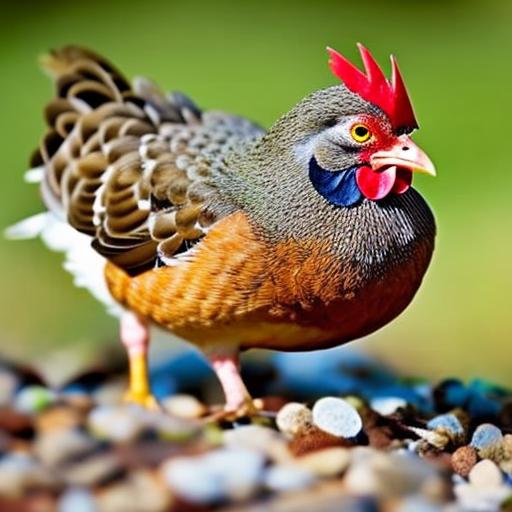Keeping chickens on gravel is a popular choice for many backyard chicken enthusiasts. It offers several advantages over traditional coop flooring options, such as dirt or concrete. Gravel provides a clean and easily maintainable surface for the chickens, while also allowing for good drainage and reducing odor. In addition, gravel is an affordable option that can be easily obtained from local suppliers.
The popularity of keeping chickens on gravel has been growing in recent years due to its many benefits. With the increasing interest in sustainable living and self-sufficiency, more people are turning to backyard chicken keeping as a way to provide their own fresh eggs and meat. Gravel flooring offers a practical solution for those looking to create a clean and healthy environment for their chickens without breaking the bank.
Key Takeaways
- Gravel is a popular flooring option for chicken coops due to its affordability and durability.
- Advantages of gravel include easy cleaning, good drainage, and reduced risk of bacterial growth.
- Disadvantages of gravel include potential foot injuries and difficulty in keeping it level.
- When choosing gravel, opt for small, rounded stones and avoid sharp edges.
- Proper preparation of the ground and regular maintenance are key to keeping a healthy and safe gravel coop floor.
Advantages and Disadvantages of Gravel as a Chicken Coop Flooring
There are several advantages to using gravel as a flooring option for your chicken coop. One of the main benefits is that it is easy to clean. Unlike dirt or concrete, which can become compacted and difficult to remove waste from, gravel allows for easy removal of droppings and other debris. This helps to maintain a clean and sanitary environment for the chickens.
Another advantage of using gravel is its good drainage properties. Gravel allows water to pass through easily, preventing the buildup of moisture and reducing the risk of bacterial growth. This can help to prevent diseases and keep the coop floor dry and comfortable for the chickens.
Gravel also helps to reduce odor in the coop. The porous nature of gravel allows for better airflow, which helps to dissipate any odors that may be present. This can make the coop a more pleasant environment for both the chickens and their owners.
However, there are also some disadvantages to using gravel as a chicken coop flooring option. One potential drawback is that it can be uncomfortable for the chickens to walk on. The uneven surface of the gravel can cause discomfort and may even lead to foot injuries. It is important to provide additional bedding or padding to help alleviate this issue.
Another disadvantage is that gravel may require more frequent cleaning compared to other flooring options. While it is easy to remove waste from the gravel, it may also become trapped between the stones, requiring more thorough cleaning to ensure a sanitary environment.
Lastly, walking on gravel can be difficult for chickens, especially those with leg or foot problems. It is important to monitor the health and mobility of your chickens and provide additional support or padding if needed.
Choosing the Right Type of Gravel for Your Chicken Coop
When choosing gravel for your chicken coop, there are several factors to consider. Different types of gravel have different pros and cons, so it is important to choose one that best suits your needs.
One common type of gravel used for chicken coops is pea gravel. Pea gravel is small and rounded, making it comfortable for chickens to walk on. It also provides good drainage and is easy to clean. However, pea gravel can be more expensive compared to other types of gravel.
Another option is crushed stone. Crushed stone is larger and more angular in shape, which can make it less comfortable for chickens to walk on. However, it provides excellent drainage and is very durable. Crushed stone is also more affordable compared to pea gravel.
When choosing gravel for your chicken coop, consider factors such as cost, comfort for the chickens, and ease of cleaning. It is also important to choose a size that will prevent the chickens from swallowing or choking on the stones.
Preparing the Ground for the Gravel Base
Before laying down the gravel in your chicken coop, it is important to properly prepare the ground. This will help ensure a stable and level surface for the gravel base.
The first step in preparing the ground is to remove any existing vegetation or debris. This can be done by hand or with the help of a shovel or rake. It is important to remove all roots and rocks to create a smooth surface.
Next, you will need to level the ground. This can be done by using a rake or a shovel to remove any high spots and fill in any low spots. It is important to create a level surface to prevent water from pooling and to ensure the stability of the gravel base.
Once the ground is level, you can add a layer of landscape fabric or geotextile fabric. This will help prevent weeds from growing through the gravel and will also provide additional stability for the base.
Building a Chicken Coop on Gravel: Best Practices and Tips
When building a chicken coop on gravel, there are several best practices and tips to keep in mind. These will help ensure that your coop is safe, comfortable, and easy to maintain.
First, it is important to choose a suitable location for your chicken coop. The area should be well-drained and away from any low-lying areas that may flood during heavy rain. It should also be easily accessible for cleaning and maintenance.
When constructing the coop, make sure to provide adequate ventilation. Good airflow is essential for maintaining a healthy environment for the chickens and reducing odors. Consider adding windows or vents to allow for proper ventilation.
It is also important to provide adequate space for the chickens. The general rule of thumb is to allow at least 4 square feet of space per chicken in the coop, and 10 square feet per chicken in the outdoor run. This will help prevent overcrowding and reduce stress among the flock.
Lastly, consider adding additional bedding or padding on top of the gravel to provide extra comfort for the chickens. This can help alleviate any discomfort caused by walking on the uneven surface of the gravel.
Maintaining a Clean and Healthy Gravel Coop Floor

Maintaining a clean and healthy gravel coop floor is essential for the well-being of your chickens. Regular cleaning and maintenance will help prevent the buildup of waste and reduce the risk of disease.
To clean a gravel coop floor, start by removing any large debris or droppings with a shovel or rake. Next, use a hose or pressure washer to rinse the gravel and remove any remaining waste. It is important to thoroughly rinse the gravel to ensure a clean and sanitary environment.
After rinsing, allow the gravel to dry completely before adding fresh bedding or padding. This will help prevent moisture buildup and reduce the risk of bacterial growth.
In addition to regular cleaning, it is important to maintain a healthy coop environment. This includes providing fresh water and food daily, as well as regularly checking for signs of illness or injury in the chickens. It is also important to monitor the temperature and humidity levels in the coop to ensure a comfortable environment for the chickens.
Feeding and Watering Chickens on Gravel: What You Need to Know
Feeding and watering chickens on a gravel coop floor requires some additional considerations to prevent contamination and maintain a clean environment.
When providing food for your chickens, it is important to use feeders that can be easily cleaned and are raised off the ground. This will help prevent waste from contaminating the food and reduce the risk of bacterial growth. Consider using hanging feeders or elevated platforms to keep the food off the ground.
Similarly, when providing water for your chickens, it is important to use clean waterers that can be easily cleaned and refilled. Avoid placing waterers directly on the gravel, as this can lead to contamination from waste or dirt. Instead, use elevated platforms or hang waterers to keep them off the ground.
Regularly clean and sanitize feeders and waterers to prevent the buildup of bacteria. This can be done by washing them with hot soapy water and rinsing thoroughly. It is also important to regularly check for any signs of contamination or spoilage in the food or water.
Protecting Your Chickens from Predators on a Gravel Coop Floor
Predators can pose a threat to chickens, even when they are housed on a gravel coop floor. It is important to take steps to protect your chickens and ensure their safety.
Common predators that may target chickens include raccoons, foxes, coyotes, and birds of prey. To protect your chickens, make sure the coop is securely built and has no gaps or holes that predators can enter through. Consider using hardware cloth or welded wire mesh to cover windows and vents.
It is also important to secure the coop at night. Make sure all doors and windows are securely closed and locked. Consider adding additional locks or latches to prevent predators from gaining access.
In addition to securing the coop, it is important to provide a secure outdoor run for the chickens. This can be done by using fencing or netting to create a barrier around the coop. Make sure the fencing is buried at least 12 inches deep to prevent predators from digging under it.
Regularly inspect the coop and run for any signs of damage or weakness that may allow predators to gain access. Repair any damage immediately to ensure the safety of your chickens.
Common Problems and Solutions for Keeping Chickens on Gravel
While keeping chickens on gravel offers many benefits, there are some common problems that may arise. Fortunately, there are solutions to these problems that can help ensure a successful experience.
One common problem is the buildup of waste between the stones in the gravel. This can make cleaning more difficult and may lead to odors or bacterial growth. To prevent this issue, consider using larger stones or adding additional bedding or padding on top of the gravel.
Another problem that may occur is the development of foot injuries in chickens due to walking on the uneven surface of the gravel. To prevent this, provide additional padding or bedding to create a more comfortable surface for the chickens to walk on.
Lastly, some chickens may have difficulty walking on gravel, especially those with leg or foot problems. To accommodate these chickens, consider providing additional support or padding in certain areas of the coop to make it easier for them to move around.
Is Keeping Chickens on Gravel Right for You?
In conclusion, keeping chickens on gravel can be a practical and affordable option for backyard chicken enthusiasts. It offers several advantages, such as easy cleaning, good drainage, and reduced odor. However, there are also some disadvantages to consider, such as potential discomfort for the chickens and the need for more frequent cleaning.
When deciding if keeping chickens on gravel is right for you, consider factors such as cost, comfort for the chickens, and ease of maintenance. It is also important to carefully choose the type of gravel and properly prepare the ground before laying down the base.
Overall, keeping chickens on gravel can be a rewarding experience that provides fresh eggs and meat while also promoting sustainable living. With proper care and maintenance, a gravel coop floor can provide a clean and healthy environment for your chickens to thrive.
If you’re considering keeping chickens on gravel, you may also be interested in learning about the importance of providing a heater for your chicken coop. Poultry Wizard has a helpful article on this topic, which explains how a heater can help keep your chickens warm and comfortable during colder months. To find out more about the benefits and considerations of using a heater in your chicken coop, check out their article here.
FAQs
What is the article about?
The article is about whether it is possible to keep chickens on gravel.
Can chickens be kept on gravel?
Yes, chickens can be kept on gravel. However, it is important to ensure that the gravel is clean and free from sharp edges that could harm the chickens’ feet.
What are the benefits of keeping chickens on gravel?
Keeping chickens on gravel can help to reduce the amount of mud and dirt in their coop and run. It can also make it easier to clean the area and prevent the buildup of bacteria and parasites.
What are the disadvantages of keeping chickens on gravel?
One disadvantage of keeping chickens on gravel is that it can be uncomfortable for them to walk on if the gravel is not smooth and free from sharp edges. Additionally, chickens may be more prone to foot injuries if the gravel is not properly maintained.
What type of gravel is best for chickens?
The best type of gravel for chickens is pea gravel or river rock. These types of gravel are smooth and do not have sharp edges that could harm the chickens’ feet.
How should the gravel be maintained?
The gravel should be raked regularly to remove any debris or waste. It should also be topped up as needed to ensure that there is enough gravel for the chickens to walk on comfortably. Additionally, the gravel should be washed periodically to remove any buildup of bacteria or parasites.
Meet Walter, the feathered-friend fanatic of Florida! Nestled in the sunshine state, Walter struts through life with his feathered companions, clucking his way to happiness. With a coop that’s fancier than a five-star hotel, he’s the Don Juan of the chicken world. When he’s not teaching his hens to do the cha-cha, you’ll find him in a heated debate with his prized rooster, Sir Clucks-a-Lot. Walter’s poultry passion is no yolk; he’s the sunny-side-up guy you never knew you needed in your flock of friends!







